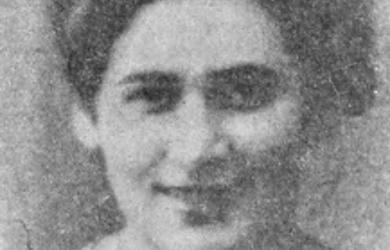 Roza Robota grew up in Ciechanow, as a member of Hashomer Hatzair. When she was 21, in November 1942, her and her family were transported to Auschwitz, where she was the only member of her family to not be killed on arrival.
Roza Robota grew up in Ciechanow, as a member of Hashomer Hatzair. When she was 21, in November 1942, her and her family were transported to Auschwitz, where she was the only member of her family to not be killed on arrival.
Robota was put to work in the Bekleidungskommando unit, which sorted the confiscated clothing and personal possessions of prisoners. There, she organised a resistance group that distributed news from radio broadcasts. She made contact with several women (including Alla Gaertner, Regina Saperstein, and Ester Wajcblum) in the Schwartzpulver factory. Despite the dangers and difficultied, these women agreed to steal gunpowder.
It took them over a year to smuggle enough to realise their goal of destroying one of the crematoriums. This gunpowder was passed onto the Sonderkommando and the Russian “Sondermen,” who fashioned it into grenades and bombs. The finished explosives were used by the Sondermen to detonate Crematorium number four, putting it permanently out of commission.
Though the Gestapo initially wrote off the possibility of women being involved, they eventually discovered the plot, and tortured and murdered Robota, Gaertner, Saperstein, and Wajcblum. Even so, none of them betrayed other members of the resistance. Before her death, Robota managed to send a message of encouragement to the underground resistance of Auschwitz. Her final message was a note scratched on a piece of paper smuggled from her cell which read “Chazak Ve’Ematz” (be strong and brave).
Milena Jesenska & Margarete Buber-Neumann